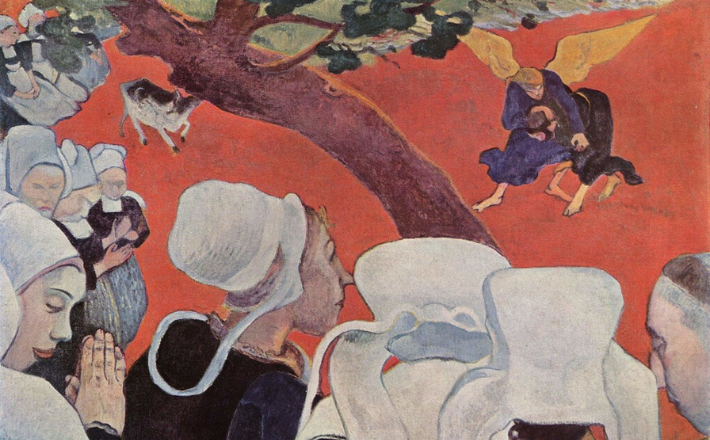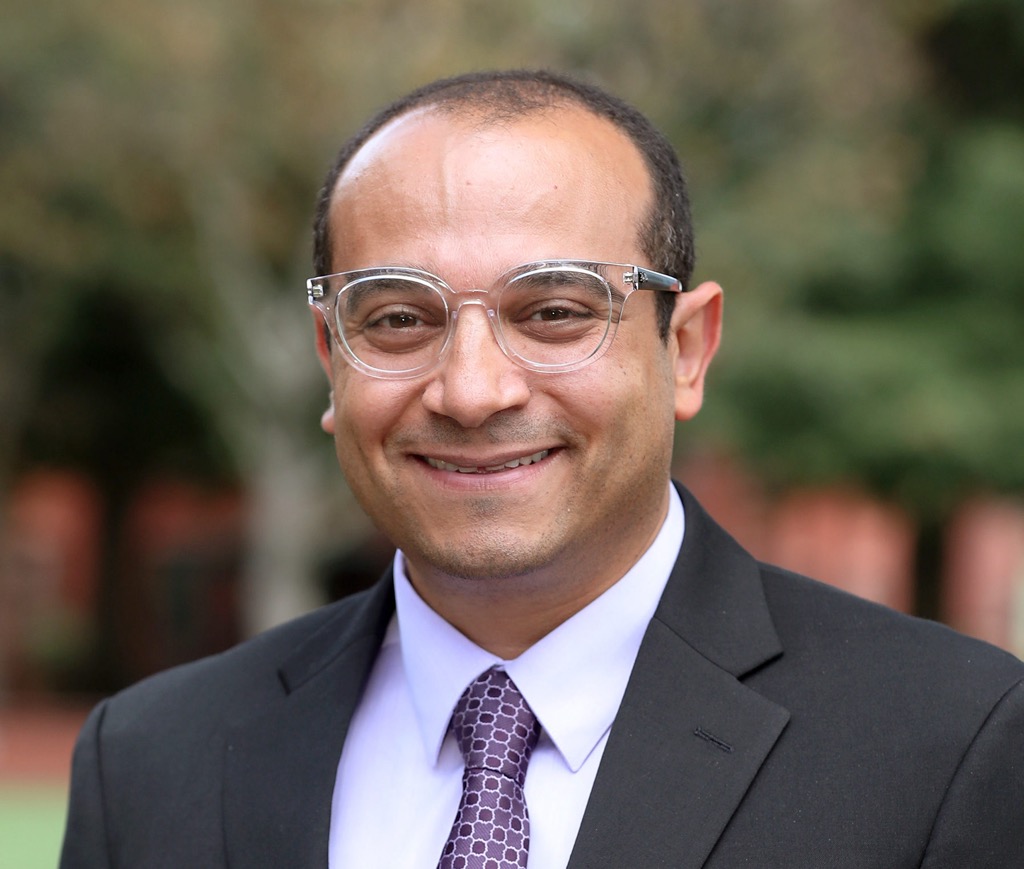Commentary on Genesis 32:[9-13] 22-30
This episode of the Jacob story narrates the well-known wrestling incident between Jacob and a mysterious person. After settling a conflict with his father-in-law, Laban, Jacob along with his wives, children, servants, and cattle head back to Canaan, where he must confront his former life in which he has deceived his brother and his father. The trek back and forth between Mesopotamia and Canaan, which alludes to the experience of exile of the whole people of Israel that happened much later when the texts were written and compiled, symbolizes a journey in which Jacob and essentially all Israel must come to terms with their identity, their relationship with God, and their relationship with their neighboring nations.
With this larger context in mind, the enigmatic wrestling match seems to portray relationships among human communities and their relationship with God as a struggle. These relationships are marked by conflict as well as possible blessings that culminate in seeing one’s identity in a new way, which seems not to happen without a struggle. Seeing one’s place in the world in a new way is grounded in a different perception of the self in relation to God and to the other, which in turn paves the way towards replacing enmity with reconciliation. It is possible then that the text is suggesting that wrestling and conflict are unavoidable. But what makes a difference is how human communities are called to transform conflict into a mutual blessing.
God’s face and sibling rivalry
Wrestling with the mysterious man interrupts Jacob’s preparation to encounter his brother Esau (Genesis 32:1-21) and the actual encounter, which is narrated in the following chapter (33:1-20). This context recalls and anticipates some literary and theological features of the beginning of Jacob’s journey as he escaped Esau’s furry and the resumption of their relationship after many years of estrangement and enmity.
Jacob’s preparation to meet his brother animates how terrified he was to meet Esau who have apparently mustered 400 people to encounter Jacob once he heard of his arrival. The gifts of cattle that Jacob sent to Esau in order to appease him ought to be contrasted with the beginning of his journey towards Mesopotamia, when he literally had nothing as he escaped the rage of his betrayed brother. Is Jacob trying to give back some of the blessing that he stole from his brother?
Furthermore, as Jacob came closer to being confronted by Esau, various encounters with the divine took place, either in the form of seeing angels (32:1-2) or by offering a prayer and a vow (32:9-12). The divine presence is certainly offering an assurance to Jacob during these horrifying moments, and they also echo how his journey to Mesopotamia had started (Genesis 29:10-22). Unlike his first prayer, which marked the beginning of his sojourn, Jacob does not put conditions to his vow, instead he offers gratitude and reminds God of the divine promises. This change in prayer signals a potential change in the way he relates to the God of his ancestors. The change in Jacob’s encounter of God prepares the way for the wrestling episode that follows.
Not only does the literary context suggest a transformation in Jacob’s relationship with God, it also underscores a drastic change in how Jacob relates to his brother. The divine words to Rebekah predicted that the older brother, Esau, would serve (‘bd), the younger brother Jacob (Genesis 25:23). When Jacob sent messengers to Esau, he called his brother lord (‘adon) twice and designated himself as a servant (‘bd; 32:5-6). Even though one cannot determine Jacob’s genuineness, the words for certain reverse the power dynamic and point towards a possible change in the relationship between Jacob and Esau.
The change in how Jacob sees himself in relation to his brother is underlined even further, when Jacob again calls himself a servant (‘bd) of Esau to whom he is sending presents so that he would be accepted in his presence. It is unfortunate that the New Revised Standard Version of Genesis 32:20 does not allow the reader to see the play on the Hebrew word pnh which means face or presence. “I may appease him [his face] with the present that goes ahead of me [my face], and afterwards I shall see his face; perhaps he will accept me [lift up his face].” Needless to say that the repetition of this word anticipates the name that Jacob will give to the place where he wrestled the mysterious person (peniel/penuel the face of God; Genesis 32:29-30). Later, when Jacob eventually meets Esau, he tells him “For truly, to see your face is like seeing the face of God” (Genesis 33:10).
What is new about Jacob’s identity?
Jacob possibly thought that he had the situation under control. God seems to be on his side. He has the financial resources to appease his brother. Angels appeared to him. He prayed and offered a vow. He sent presents to his brother. Doing these things probably gave him a sense of peace that he can be by himself. Therefore, after Jacob sends off the presents in Esau’s direction, he and his family cross the stream of Jabbok, which connects with the Jordan River about 23 miles north of the Dead Sea, in the middle of the night. Yet, the unexpected happened. The struggle was not over, and it came from where he did not expect it to come. At Jabbok (yabok) a man wrestled (yabeq) Jacob (y’qob). But who wrestled Jacob?
The identity of the man who wrestled Jacob falls into three interpretive lines. Traditionally, interpreters assumed the person is an embodiment of God. Other interpreters suggest that this person is Esau. A third view combines both suggestions arguing that the mystery is intentional, and this person represents both God and Esau.¹ It seems to me that this person is an embodiment of God. Yet, the struggle with God here is not separate from Jacob’s conflict with his brother Esau. As I mentioned above, Jacob draws the connection between seeing God’s face and seeing the face of Esau. This precisely shows that even though encountering God and Esau are connected, they are not one and the same.
Jacob asks for a blessing. The blessing he receives is a new name, which symbolizes a new way of seeing his identity. His name is going to be changed from Jacob to Israel. Even though Jacob has deceptively received a blessing from his father, which started all this conflict with his brother, he still asks the mysterious person for a blessing. The text has made it clear that Jacob has abundance in material blessings. So what kind of blessing is Jacob looking for? Does that explain why the mysterious person asks Jacob about his name. Does the mysterious man see a desire for a different blessing in Jacob’s request?
The name Jacob is explained in Genesis 25:26 to stem from the Hebrew root ‘qb which denotes the heel or grabbing the heel. This meaning signifies a life of struggle and conflict. Indeed, that explains Jacob’s life that is marked by deception and disputes with his father, brother, and uncle. Another view however argues that the name Jacob comes from a semitic root (‘qb) that means to protect. The name is this case is a shorter version that calls on the deity to protect. At any rate, the mysterious person tells Jacob that his name is not going to be Jacob anymore, but it will be Israel. The etymology of the name Israel is uncertain. One theory suggests that the root here is srh which means to strive. But who is the subject of the striving here? El (God)? or Jacob? Does the name mean El fights? Or God fighting? Another theory suggests that the word comes from the Hebrew root srr “to have dominion,” which would indicate the sense that “he had power over God.”²
Indeed, by giving Jacob the name Israel, the enigmatic person who wrestled Jacob affirms Jacob’s trait as someone who fights, strives, and reaches for dominion. But how is that different from ya’aqob? It seems to me that the key difference lies in how Jacob strives. Is it by deception and running away? Or is it by confrontation and bodily encounter with God and familial relations to create a space for his desire to be blessed?
Is the blessing something that Jacob deceives to receive? Or is it a gift from the mysterious God who refuses to be controlled by humans as this God refuses to give away their name?
What does dominion look like when it is imprinted on Israel’s body as a physical impairment? Is this blessing creating a space to the inclusion of the differently abled bodies into the people of God? The body that is blessed here escapes what has always been called “normal,” and thus deconstructs exclusionary forms of power and dominion.
If Jacob calls seeing Esau’s face like seeing the face of God, what does this reveal about the nature of “striving” or “having dominion”? Is it a continuity of claiming an identity over/against the other or is it a new identity that is constructed as a gift from God in which the face of God is seen in the other?
Notes:
- See discussion in Kathleen M. O’Conner, Genesis 25b-50 (Smyth & Helwys Bible Commentary; Macon, Ga.: Smyth & Helwys Publishing, 2020) 102.
- See the discussion of the etymology of the names in Nahum M. Sarna, The JPS Torah Commentary: Genesis (Jewish Publication Society, 1989), 227-228.
PRAYER OF THE DAY
Holy God, your servant Jacob wrestled with your angel and prevailed. In honor of his persistence you gave him a new name. Teach us to persist in the face of struggle, and call us by name. Amen.
HYMNS
Blessed be the God of Israel ELW 250
Onward, Christian Soldiers H82 562, UMH 575
Bring Many Names GG 760, NCH 11
O Holy Spirit, Root of Life ELW 399, NCH 57
CHORAL
For he shall give his angels charge, Kenneth Jennings


September 24, 2023